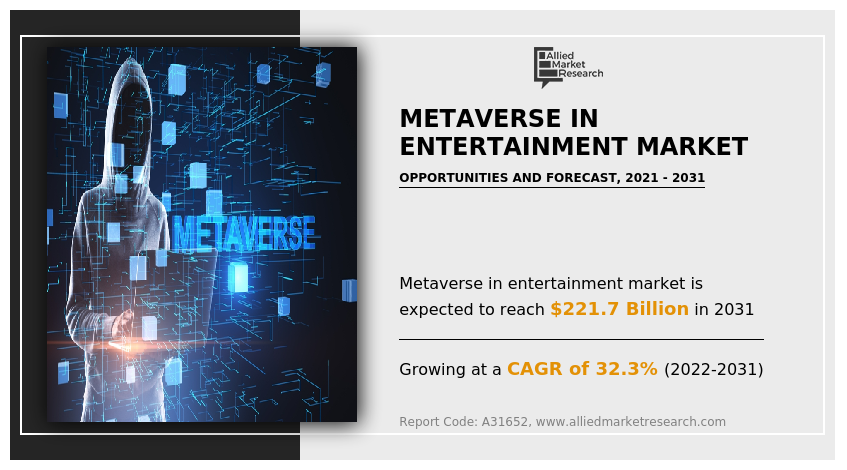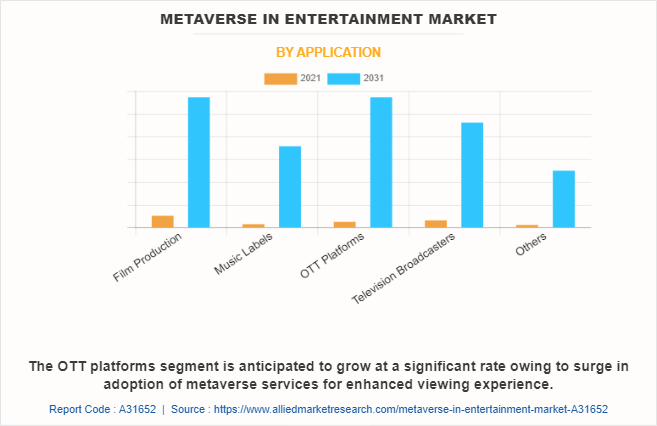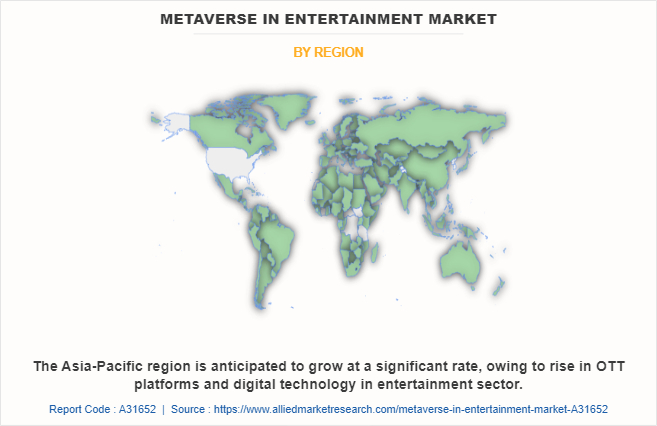Metaverse In Entertainment Market Insights, 2031
The global metaverse in entertainment market size was valued at $13.8 billion in 2021, and is projected to reach $221.7 billion by 2031, growing at a CAGR of 32.3% from 2022 to 2031.
Increase in consumer spending across virtual concerts, events, and others drives the market growth of metaverse in entertainment market. Due to metaverse's rapid expansion and spread of virtual events and technological innovations that improve audience engagement and support franchise development, the market is being propelled. In addition, the ability of metaverse to cater to the desire of users to connect with a community fuels the growth of the metaverse in entertainment market.
However, privacy and security concerns over the metaverse, legal challenges associated with the rights of digital collectibles, and the high cost of AR and VR devices limiting the growth of the market. On the contrary, the initiatives for the advancements of digital transformation of a metaverse in the entertainment industry such as using blocking technology in metaverse can contribute a lot to digital transformation. As a result, these factors are expected to offer lucrative growth opportunities for the metaverse in entertainment market in the upcoming years.

The term "metaverse" describes the combination of digital tools used to build a virtual world. These technologies include social media, virtual reality, online gaming, and interactive components of augmented reality (AR), as well as cryptocurrencies. Due to its 3D capabilities, the integration of metaverse in a variety of media and entertainment applications gives consumers an immersive experience. In addition, the use of metaverse in media and entertainment applications is gaining traction as it creates a virtual environment for conducting professional interviews and meetings, broadcasting news, organizing online events, and interacting with other people using 3D avatars. The metaverse in entertainment market is segmented into Component, Technology and Application.
Segment Review
The metaverse in entertainment market is segmented on the basis of component, technology, application, and region. By component, it is segmented into hardware, software, and service. By technology, the market is divided into blockchain, virtual and augmented reality, mixed reality, and others. By application, it is bifurcated into film production, music labels, OTT platforms, television broadcasters, and others. By region, it is analyzed across North America, Europe, Asia-Pacific, and LAMEA.
On the basis of application, the film production segment dominated the overall metaverse in entertainment market share in 2021, and is expected to continue this trend during the forecast period. This is attributed to rise in demand for next-level immersive experience. However, the OTT platforms segments is expected to witness highest growth due to rise in number of SME’s investing in virtual environment technology in video streaming platforms.

Region wise, the metaverse in entertainment industry was dominated by North America in 2021, and is expected to retain its position during the forecast period, owing to high concentration of metaverse technology vendors in the region. However, Asia-Pacific is expected to witness significant growth during the forecast period, owing to rise in adoption of metaverse by entertainment players in the region.

Top Impacting Factors
Ability to cater to the desire of users to connect with a community
Within the metaverse, concepts such as transmedia, 3D avatars, and digital interactive spaces have propelled a big shift in how people interact with each other and the type of digital media content they consume. There has been a creation of converged interoperable virtual spaces where users can choose between diverse digital entertainment venues, services, and events in accordance with their preferences. Altogether, these virtual events and digital media streams foster the expansion of a borderless metaverse, a unified, continuous, and persistent virtual realm wherein users are free to create, explore, and interact with varied environments and other participants. Furthermore, considering the enormous potential of the metaverse for interactive world-building and immersive storytelling, the construction of real-life virtual spaces for entertainment brands has brought to life the spatial universe. Therefore, these factors of metaverse in entertainment are considered as the major driving factors for the growth of metaverse in entertainment market.
Rise in consumer spending across virtual concerts, events, and others
Digital experiences that embrace a hybrid approach with the integration of in-person experiences and features such as remote viewing, virtual co-presence, and live streaming, appeal immensely to users in the metaverse. Furthermore, entertainment and media brands also offer mixed-media, 3D avatars, real-time video streaming, and augmented/virtual reality services to reinvigorate new digital experiences and build new digital products. Therefore, these factors are responsible for rising consumer spending across AR/VR, video streaming and others which propelled the growth of the metaverse in entertainment market.
Country Specific Statistics & Information
Developed countries such as UK and U.S. are increasingly targeted by the key players to develop and launch metaverse features into the existing entertainment sector. For instance, in May 2022, Niantic, the technology company behind Pokemon Go, has partnered with UK-based digital technology authority Digital Catapult to develop a 'real-world metaverse'. The Niantic Lightship Augmented Reality Accelerator provides UK entrepreneurs the opportunity to engage with Cartoon Network and globally renowned choreographer Wayne McGregor to create immersive experiences.
COVID-19 Impact Analysis
The COVID-19 pandemic had an overall positive impact on the global metaverse in entertainment industry and its opportunities. According to a report published by SAGE Journals in May 2021, average time spent on playing video games went up by more than 71% during the period of COVID-19 lockdowns.
This influenced many popular game companies to expand their offerings portfolio during the period. For instance, in July 2020, Epic Games partnered with American rap artist, Travis ScOTT to host their Astronomical Tour in Fortnite. This concert stacked up 45.8 million live audiences in-game and over 120 million views through live streams on YouTube and Twitch. Such instances are promising great opportunities for the future of metaverse platforms and technologies which is anticipated to grow in the coming years.
Key Developments/Strategies
- In May 2022, Volumetric technology pioneer Tetavi and the NHL's LA Kings today announced a new partnership dedicated to enhancing fan experience and engagement. The LA Kings are the first team in the NHL to use volumetric technology to create immersive content and experiences for their fans. The partnership debuted with two videos using volumetric capture of the LA Kings' top players including captain Anze Kopitar, Phillip Danault, Adrian Kempe, Viktor Arvidsson, Trevor Moore and Alex Iafallo, and its beloved mascot Bailey for the in-arena experience on the jumbotron.
- In April 2022, Epic Games announced that it has partnered with Lego to build a metaverse for kids. The companies planned to work towards shaping the future of the metaverse and to make it safe and fun for children while building an immersive digital experience for kids to play in.
- In March 2022, Qualcomm announced the launch of the Snapdragon Metaverse Fund, established to invest up to $100 million in developers and companies building unique, immersive XR experiences, as well as associated core augmented reality (AR) and related artificial intelligence (AI) technologies. The fund plans to deploy capital through a combination of venture investments in leading XR companies by Qualcomm Ventures and a grant program by Qualcomm Technologies, Inc. for developer ecosystem funding in XR experiences such as gaming, health and wellness, media, entertainment, education, and enterprise.
- In January 2022, Qualcomm Technologies announced a partnership with Microsoft to expand and hasten the adoption of augmented reality (AR) in the enterprise sector. This collaboration reflects the next step in both companies' shared commitment to XR and the metaverse.
Key Benefits for Stakeholders
- This report provides a quantitative analysis of the market segments, current trends, estimations, and dynamics of the metaverse in entertainment market analysis from 2021 to 2031 to identify the prevailing metaverse in entertainment market opportunities.
- The market research is offered along with information related to key drivers, restraints, and opportunities.
- Porter's five forces analysis highlights the potency of buyers and suppliers to enable stakeholders make profit-oriented business decisions and strengthen their supplier-buyer network.
- In-depth analysis of the metaverse in entertainment market segmentation assists to determine the prevailing market opportunities.
- Major countries in each region are mapped according to their revenue contribution to the global market.
- Market player positioning facilitates benchmarking and provides a clear understanding of the present position of the market players.
- The report includes the analysis of the regional as well as global metaverse in entertainment market trends, key players, market segments, application areas, and market growth strategies.
Metaverse in Entertainment Market Report Highlights
| Aspects | Details |
| Market Size By 2031 | USD 221.7 billion |
| Growth Rate | CAGR of 32.3% |
| Forecast period | 2021 - 2031 |
| Report Pages | 245 |
| By Technology |
|
| By Component |
|
| By Application |
|
| By Region |
|
| Key Market Players | Tetavi, Epic Games, Inc., Hungama Digital Media Entertainment Pvt. Ltd., Meta, Overactive Media Group, Roblox Corporation, Niantic, Inc., Qualcomm Technologies, Inc. , QUEPPELIN, Tencent |
Analyst Review
Metaverse describes the seamless convergence of technologies that can offer a robust virtual world for people to work, play, and to entertain themselves. It effectively combines interactive elements of online games, social media, and video communication to create an innovative experience that blends different digital media experiences in a single virtual platform in real-time. Furthermore, metaverse has the potential to enhance the experience of consumers of content offered by the media and entertainment industry. Filmmakers and studios are rapidly adopting technologies deployed to create the metaverse to develop digital collectibles to offer enhanced experience to consumers across the globe. In addition, for instance, in October 2021, Meta Platforms Inc. made it easier for brands to run three-dimensional ads on its Facebook and Instagram social media platforms through a partnership with an e-commerce technology firm VNTANA. The integration with VNTANA allows the brands to upload the 3D models of their products to Facebook and Instagram and easily convert them into ads.
Moreover, for instance, in November 2021, AR technology company Niantic, best known for Pokémon GO, launched Lightship, an AR Developer Kit (ARDK) that makes building augmented reality experiences more accessible. Furthermore, in March 2022, GameOn Entertainment Technologies Inc., a leading NFT game technology company partnered with the world’s biggest IPs to launch, operate, and monetize NFT-based games, has partnered with immersive content pioneer, Tetavi, for a first-of-its-kind NFT music discovery game. Established in 2016, Tetavi is a new media technology company and the leader in volumetric video capture. In addition, the company uses cutting-edge volumetric video technology and proprietary algorithms built on thousands of hours of machine learning to create next-generation photorealistic digital content and immersive experiences. Their mission is to enable connection, self-expression, and creativity in the Metaverse and Web3.
The global metaverse in entertainment market was valued at $13,827.26 million in 2021, and is projected to reach $221,744.89 million by 2031, registering a CAGR of 32.3% from 2022 to 2031.
Increase in consumer spending across virtual concerts, events, and others drives the market growth of metaverse in entertainment market. Increase in consumer spending across virtual concerts, events, and others drives the market growth of metaverse in entertainment market.
The key growth strategies for metaverse in entertainment market include product portfolio expansion, acquisition, partnership, merger, and collaboration.
North America is the largest region for metaverse in entertainment market.
Epic Games, Inc., Hungama Digital Media Entertainment Pvt. Ltd., Meta, Niantic, Inc., Overactive Media Group, Qualcomm Technologies, Inc., QUEPPELIN, Roblox Corporation, Tencent, and Tetavi.
Loading Table Of Content...
Loading Research Methodology...



